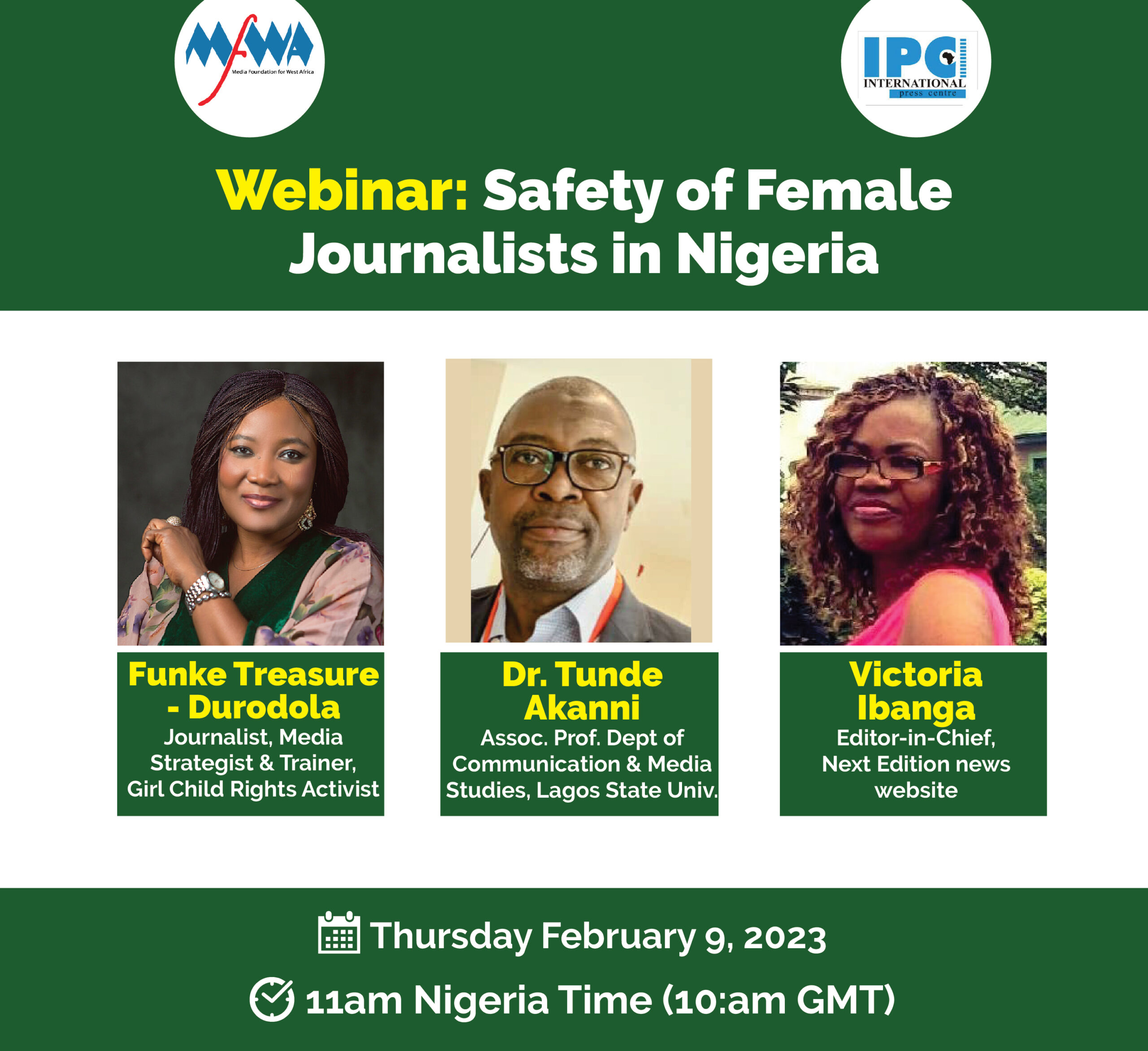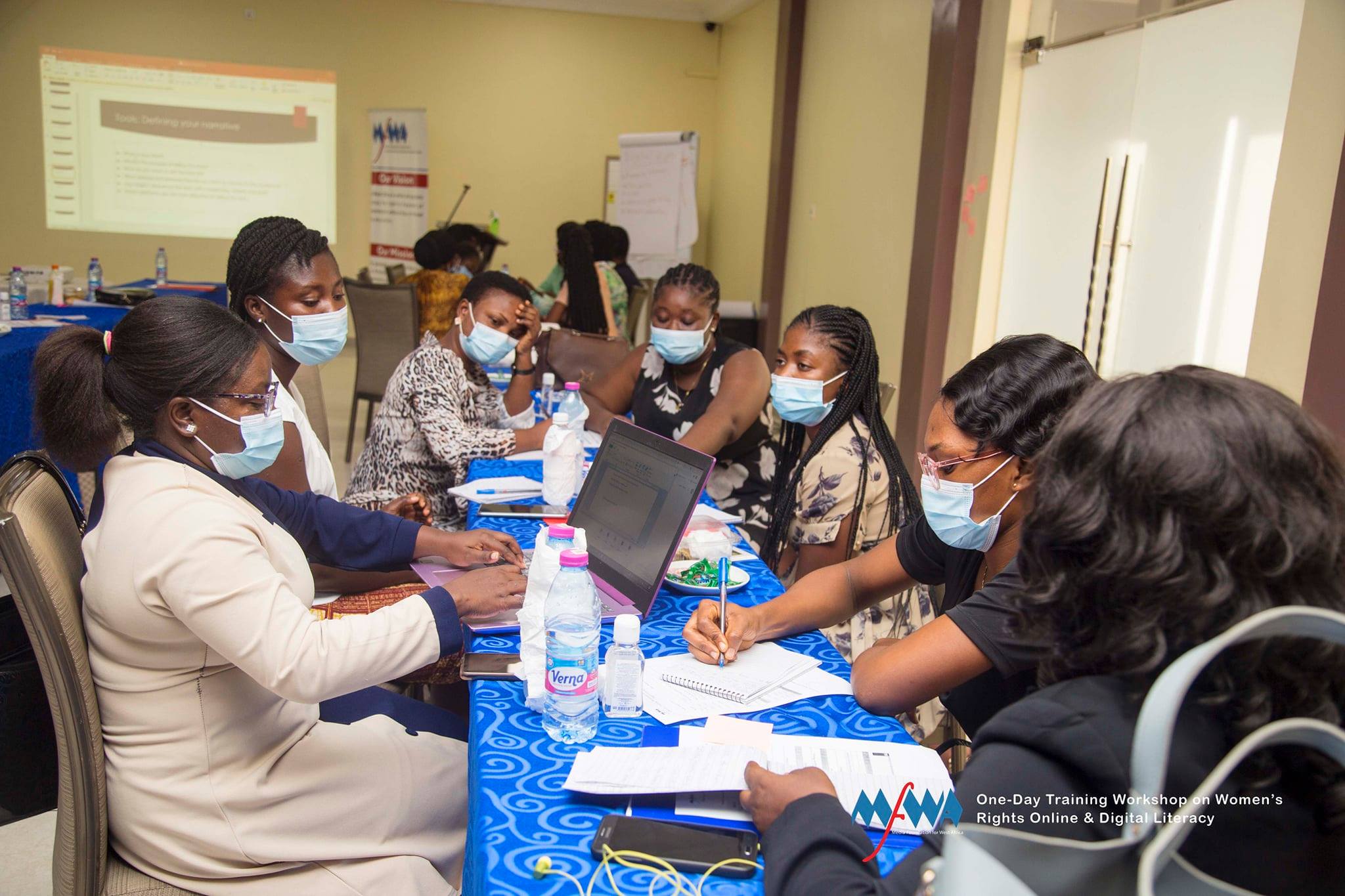The Media Foundation for West Africa (MFWA) has observed a growing trend in physical attacks, arrests, threats, harassment (online and offline) of female journalists in West Africa.
While these types of attacks are often reported, there are other lesser reported but more traumatic issues that these female journalists silently endure, including sexual harassment and discriminatory practices in newsrooms in the course of their work.
In line with this, the MFWA commissioned and produced five reports on the safety of female journalists in five West African countries. These are Burkina Faso, Guinea, Niger, Nigeria, and Guinea Bissau.
The MFWA subsequently organised a webinar on the content of the said reports on the safety of female journalists in three of the five Francophone countries, namely Burkina Faso, Niger and Guinea, on Wednesday 1 February 2023. This was the first of a series which was followed by a webinar in English on Nigeria on 9 February 2023.

The first panel featured seven (7) female journalists: Ms. Binta Nabé, Ms. Diaraye Guirassy, Ms. Ramatoulaye Diallo from Guinea, Ms. Ahamed Sidi Balkissa, Ms. Mariama Moussa, Ms. Marie-Rose Tamakloe, from Niger and Mrs. Aminata Sanou from Burkina Faso.
The three consultants who conducted the studies, namely Dr Lassane Yaméogo from Burkina Faso, Mr Ibrahima Moussa from Niger and Mr Iboun Conté from Guinea were also invited to the discussion.
Mr. Moussa Iboun Conté, who also acted as the moderator, invited Dr. Lassane Yaméogo, who gave an opening statement on his report on the safety of female journalists in Burkina Faso.
Dr. Lassane Yaméogo highlighted the physical violence, sexism and sexual harassment to which female journalists in Burkina Faso are subjected when reporting on political and social issues, as well as within the public administration, the private sector and their respective newsrooms.
In the course of his study, he had the opportunity to interview female journalists from the country and other resource persons who recounted instances of outrageous abuse of female journalists. He suggested that the protection of journalists should be covered by special legislation, which is not yet the case in Burkina Faso.
Meanwhile, Iboun Conté, the consultant who drafted the Guinea report, spoke of legal gaps regarding the safety of female journalists. mentioned sexist comments and sexual harassment in newsrooms as the commonest acts of abuse suffered by female media workers in Guinea.
Mr Ibrahim Moussa, Consultant, who wrote the report on the safety of female journalists in Niger, was unable to join the panel as he was travelling and had poor internet connection.
All the panellists unanimously replied that they had read these three reports and added that they found them comprehensive with reliable data on their countries regarding the safety of female journalists.
Mrs. Aminata Sanou said that women journalists are in a precarious situation in terms of safety both offline and online. According to her, newsrooms do not have any mechanism to ensure the physical and psychological safety of female journalists. They are left to their own devices to overcome the threat of physical assault on the field, sexual harassment, including within the newsroom, as well as harassment on social media.
“As far as sexual abuse is concerned, victims are afraid of being stigmatised or even of having their claims doubted. Many of them therefore refuse to speak out about sexual harassment because of the pressure from African tradition,” concluded Ms Sanou, a journalist with Burkina 24.
Mrs. Ahamed Sidi Balkissa, a journalist with Radio Fara’a GAYA as well as Freelancer at the Kalangou studio in Niger, also said that socio-cultural constraints are the real obstacle to female journalists seeking justice against their abusers in their respective countries. According to her, the relatives of an assaulted journalist often manage to dissuade her from filing a complaint, reasoning that this could give her a bad reputation as a shrew, a difficult woman, which goes against the established image of women.
Mrs. Marie-Rose Tamakloe, journalist and gender focal person at the Superior Council of Communication (CSC) of Niger, also said that in addition to the social and cultural constraints that dissuade female journalists from filing complaints against their abusers, the insecurity and the economic environment in which female journalists live are other factors that worsen the situation. For example, she mentioned that the lack of safe transport is one of the challenges faced by female journalists, some of whom work at odd hours, including late night shifts.
Mrs. Binta Nabé observed that in Guinea, the Criminal Code provides a series of penal sanctions against the perpetrators of violence, be it physical violence, gender prejudice or sexual harassment. She therefore called for sensitisation of women, including journalists, to recognise and defend their rights.
Mrs. Ramatoulaye Diallo began by stating that as Editor-in-Chief of the website ”Guinee114”, she noticed that some of her male colleagues demonstrated big egos and that they were uncomfortable with the idea of being led by a woman. She added that patriarchy does not look favourably on the professional achievement of women, hence the range of obstacles erected against women in the newsroom.
As for Mrs. Diaraye Guirassy of Groupe Fréquence Médias, she recalled that although the law on freedom of the press does not contain specific provisions for the protection of women journalists, it must be noted that the rights contained therein protect both male and female journalists.
She went on to say that media partners in West Africa should start thinking about legal aid for female journalists so that they can prosecute their abusers in their own countries.
All the panellists from the three countries called for the support of press freedom organisations on various issues, including the reform of press freedom legislation to include provisions for the protection of female journalists in West Africa. They also advocated for appropriate measures to be taken, including training workshops to sensitise media professionals and other relevant actors on the phenomenon of sexual harassment and all forms of discrimination within and outside the newsroom. The panelists also mentioned the establishment of a legal aid mechanism to enable them to prosecute their abusers in court.
To this effect, they further suggested that the Media Foundation for West Africa (MFWA) initiates an advocacy campaign in the three countries to ensure that the above recommendations as well as the other recommendations announced in the reports of the three countries on the safety of female journalists are taken into account.
Safety of female journalists in Nigeria
The content of the reports was also on the agenda at a webinar on the safety of female journalists in Nigeria, held on 9 February 2023. One of the three panelists, Dr Tunde Akanni, Dean of the Faculty of Communication and Media at the University of Lagos State, launched the event with a brief presentation of the report’s findings.
According to the report, the main security challenges faced by female journalists are related to the coverage of political issues, elections and violence in unstable regions of the country. These challenges include threats, hate speech, police brutality, bullying and sexual harassment. In the case of sexual harassment, the perpetrators are often found within the newsroom itself.
Anike-ade Funke Treasure, a senior journalist, advised all female journalists to prioritise and take care of themselves when covering stories, especially during the upcoming 2023 presidential elections. She urged all female journalists to monitor their online footprint and what they say online, and advised them to learn personal safety tips online that will help them stay safe. She also stressed the importance of safety training for journalists, especially female journalists, who may be more vulnerable than their male counterparts. She also urged media organisations and media associations to prioritise insurance programmes.
Mrs. Victoria Ibanga, editor-in-chief of the online newspaper Next-Edition, who spoke after Ms. Funke, explained that there are still many abuses that female journalists do not mention for fear of being stigmatised. She said that most of the attacks female journalists face go beyond mere physical attacks, as they can seriously affect their mental well-being.
Ms Ibanga also recommended that media houses set up safety desks, invest in safety equipment. To raise awareness on the issue of safety of female journalists, media freedom organisations such as IPC, Media Rights, etc., could organise a group and visit media houses to discuss the issue, Ibanga also recommended.
One participant recommended that female journalists be paired with their male counterparts when covering events, especially elections and violence by extremist groups.
Responding to a question from a participant, Dr Tunde Akanni, recommended that media houses should mobilise and combine their resources to ensure the welfare and safety of female journalists. These resources can be augmented by garnering support from relevant charities and other female journalists who are established enough to contribute to the effort. It is also important that female journalists learn to support each other. Dr Tunde Akanni also called on female journalists to dress decently and according to the events they are assigned to cover.
Mrs Funke stressed the importance of having workplace policies that promote the safety of female journalists. She called on everyone, especially the IPC and its partners, to go beyond the production of the report.
“It should not be for research purposes. It’s also about bringing about change, making sure that change ultimately happens, advocating for a policy on sexual harassment in newsrooms that will be binding, not only on employees but also on the management of news organisations,” she added.






